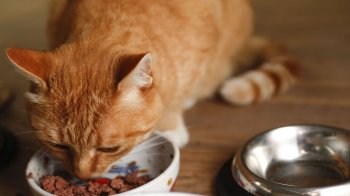Pet obesity is a common health problem. Obesity can lead to numerous other health problems, reduced quality of life, and even years of pain for pets. Many people don’t worry too much about a little extra weight, but even a pound or two can have a drastic impact on your animal’s future health.
Cats in particular, especially because they have small frames and need mobility for play, can be affected by too much weight gain. If you are a cat owner, educate yourself about the risks and causes of obesity in cats. With the right preventative care, your cat can stay at a healthy weight.
Risks from Feline Obesity
Many people do not realize that extra weight on a cat should be taken very seriously. Humans may gain five or ten pounds without noticing any problems. But, when they see just a pound or two of weight on a cat, they don’t think that such a small amount of weight is something to worry about.
However, because cats are much smaller than people, even just two pounds of extra weight on a cat that only weighs ten pounds is a lot of extra mass. For comparison, if you weighed 160 pounds, adding the same comparative amount would put you at 190 pounds! That’s a big difference, and it would affect everything you did.
Obesity in cats can lead to:
- Chronic joint problems. The pressure from the extra weight can accelerate the progress of arthritis and degenerative joint illnesses.
- Diabetes. Cats can develop insulin resistance, and weight is a major factor in whether or not your cat will get this disease.
- Liver failure. Extra fat deposits in the liver make it harder for the liver itself to work well.
If you are not sure if your cat is overweight (in some larger breeds, it can be hard for you to tell if your cat is simply big or if they are overweight), contact your vet to do an assessment.
Causes of Feline Obesity
Generally, most people associate extra weight gain with eating too much. Some cats do gain weight because they are overfed. However, some cats may seem to never really eat very much, and they still will have trouble with their weight.
Inactivity
Usually, weight gain is caused by a number of factors working together. A common reason why a cat can start to put on weight is because of inactivity.
Your cat is not a dog. It doesn’t need to be walked and it probably isn’t jumping up and down when you walk in the door. However, just because cats are a lower-energy pet does not mean that they should spend all their time resting in the warm patch of sunlit carpet.
Cats need exercise. You should spend time each day making sure your cat gets moving. Cats adapt to laziness, so if they are ignored, they will not have the physical stimulation they need. Remember, cats in the wild spend plenty of time snoozing in the sun, but those times of inactivity are offset by periods of speed and strength when hunting or playing together.
Provide similar stimulation for your cat. Play with toys, have your cat chase a string, and if you have more than one cat, encourage play with shared toys. Cats can also benefit from having perches for jumping and tunnels to run through.
Treats
Another reason why cats can gain weight is because of too many calorie-dense treats. Your cat should have a healthy diet of high-quality cat food that is served daily in measured portions. You can use treats occasionally, but too many treats can quickly lead to extra poundage.
Cats are not people, and owners need to remember this. Cats don’t need dessert, they should not be fed human food from the table, nor do they feel sad or left out because they are not eating with everyone else. Some owners give treats to assuage guilt about leaving a cat alone for the day or as a bribe to get a cat to do what they want.
Also, when choosing cat food, look for food that is balanced with a high meat content. Too many carbohydrate fillers like corn or wheat are hard for cats to digest and can lead to more weight gain.
Prevention and Solutions
Your vet can help you put your cat on a diet. They might recommend different food and smaller portions. If sedentary lifestyle is the main issue, you vet might want to see a gradual return to daily activity. Don’t try to restrict your cat’s food without the guidance of a veterinarian. You need to make sure that your cat still gets vital nutrients.
You can also help prevent obesity by getting regular health checks. Sometimes extra weight creeps up slowly, and you might not really notice until the problem is severe. It’s easier to correct when your cat isn’t already struggling with health and mobility issues.
For more information, contact us at 1st Pet Veterinary Centers.

